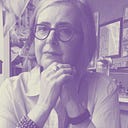What’s the Difference: A Case for Empathy
We’ve been at this for a while. The Quran, the Bible, the Torah, the teachings of Buddha all prioritize the equality of all human beings. And yet…
Many human beings (perhaps all, to some degree) are still influenced by our primitive brain’s anachronistic priority to see difference. Our amygdala works to protect us, to recognize physical danger — like lions and tigers. But somehow it still rules us to the point that we can see age, race, colour, sex, economic status, deformity—anything we discern, real or imagined— as a danger (or as prey). Think about how antithetical this is to the teachings of our religious texts.
Human beings tend to organize and categorize our fellow human beings as less than we are based on any number of “logical” or “illogical” factors. For the majority of us there are also those we see as better than we are, based on those same factors. As Isabel Wilkerson writes in her recent book, Caste: the Origins of our Discontents, “No ethnic or racial category is immune to the messaging we all receive about the hierarchy, and thus no one escapes its consequences.” I would add that human beings create “categories”of all kinds (beyond ethicity and race) in our relations with others, particularly when we believe that our livelihoods, our property values, our our way of life are threatened. To carry Wilkerson’s idea through, we are all subject to hierarchy whether we particpate or not. And that hierarchy effects how others see us as much as how we might see them.
What does “better” give us?
We hold these truths to be self-evident, that all men are created equal, that they are endowed by their Creator with certain unalienable Rights, that among these are Life, Liberty and the pursuit of Happiness.
— American Declaration of Independence, 1776
…all individuals should have an opportunity equal with other individuals to make for themselves the lives that they are able and wish to have and to have their needs accommodated, consistent with their duties and obligations as members of society, without being hindered in or prevented from doing so by discriminatory practices based on race, national or ethnic origin, colour, religion, age, sex, sexual orientation, gender identity or expression, marital status, family status, genetic characteristics, disability or conviction for an offence for which a pardon has been granted or in respect of which a record suspension has been ordered.
— Canadian Human Rights Act, 1985
How long will we chase the top as we see it? When does it become less important to be better, more important, richer, more “valuable” than another person?
From my own experience, age has changed my perspective. In my 20s and 30s, I chased a goal that, by my 40s, I had achieved in spades. I felt closer to “the top” than I had ever imagined I would be. In my 50s, my husband and business partner of 30 years was diagnosed with pancreatic cancer. That battle lasted six years. It changed my life. It destroyed the tall tower I had built underneath myself and brought me to a quivering mass below it. I could never have imagined going through something like that. I would never have believed that I could. And yet, I came through the other side shattered, but alive and still able to “cope” day to day (although thriving was a long way off). Most notably, it changed how I “saw”.
I believe that, as we get older, many of us develop more of a “live and let live” point of view. It’s no wonder that sages are generally older folk. But I think that there must be a way to bring a more balanced vision of others into our understanding at an age where we can make things better for those who need a leg up.
Kids learn what is called othering at home. Many are taught that certain people are lazy, useless, dirty, subhuman. Sometimes it’s subtle, but it’s always there. In small jokes, and in family conversations, many kids learn that drug addicts are lazy and rich kids are spoiled. Then they take these memes to school and spread them faster than the common cold. What if we taught this balanced view in schools? What if Social Studies were actually Social Studies? Could we set kids on a better path that influences the way they vote…that they do vote? What if kids became advocates for others? There are some young people that already have this gift. Can we help them leverage that gift in influencing others? Can empathy be taught?
In my life-changing episode of breaking down and rebuilding, I was inspired to work on making life more balanced for those who suffer from addiction, mental illness, brain injury and life altering negative circumstances. I know enough about the world to know that the best road to change is education. So it comes back to teachings…. Let’s find a way to get these learning opportunities back in classrooms. That will be my project for the foreseeable future.
